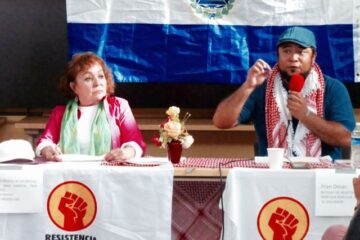Immigration reform efforts — too long centered on punitive punishments – should instead focus on treating undocumented immigrants with more flexibility in line with constitutional values says Aarti Kohli in a new ACS Issue Brief.
As President Obama and Congress grapple with efforts to enact comprehensive immigration reform, Kohli, former director ofBerkeleylaw school’s Immigration Policy Institute, covers the nation’s history of immigration reform, noting it has largely left undocumented persons with very few rights while not deterring the number of people migrating to the country.
For example, the 1996 Illegal Immigrant Reform and Immigrant Responsibility Act “built upon previous efforts to limit due process for immigrants, broaden categories of deportable immigrants, streamline deportation processes by limiting and eliminating procedural protections and further limit discretion of the executive and judicial branches of the government in deportation proceedings,” Kohli notes. “Mandatory deportation was no longer limited to murderers and drug kingpins; the definition of aggravated felonies expanded once again to include minor drug offenses, thefts, and crimes of violence.”
But such changes, Kohli writes in “What Process is Due?: A Return to Core Constitutional Principles in Immigration,” have eroded the few due process rights the federal government had been willing to extend to noncitizens, while doing little to stem the tide of people migrating to the country.
“Legislative changes in the past thirty years have been increasingly punitive towards any noncitizen who has violated our laws,” Kohli writes. “These punitive policies have failed to deter undocumented immigration, not because they are not harsh (they are), but because they fail to understand demographic and economic realities.”
A different road to immigration must be created, Kohli states, unless the nation wishes to continue to allow state lawmakers to create and enforce “racially” discriminatory measures in the name of immigration reform.
“Rather than continuing on the road of ever-escalating and expensive penalties, we should embrace the opportunity in immigration reform to restore due process in our laws,” she writes.
Her brief provides recommendations for reform, such as focusing punitive measures on undocumented persons “convicted of serious, violent felonies,” and allowing immigration judges to employ a “balancing test” that takes several factors into account before determining whether deportation is called for.
“The major lesson learned from past reforms is that harsh, punitive measures, both in criminal and civil immigration laws, have not deterred unlawful immigration nor have they made us safer; rather our current laws wreak havoc on families, particularly U.S.-born children who have been left fatherless or motherless,” Kohli concludes.
Kohli’s work is a part of a larger ACS project: “Toward a More Perfect Union: A Progressive Blueprint for the Second Term,” a series of ACS Issue Briefs offering ideas and proposals that we hope the administration will consider in its second term to advance a vision consistent with the progressive themes President Obama raised in his second Inaugural Address. The series should also be useful for those in and outside the ACS network – to help inform and spark discussion and debate on an array of pressing public policy concerns. The series covers a wide range of issue areas, including immigration reform, campaign finance, climate change, criminal justice reform and judicial nominations.
United We Dream Releases 20 Point Immigration Reform Plan
This week, on a telephonic press conference, immigrant youth leaders with United We Dream released 20 specific policy principles for immigration reform, laying out a common-sense agenda for change and demanding a path to citizenship in less than 7 years without any unreasonable or unfair requirements. As the immigration reform debate kicks into high gear, UWD’s principles are the first community-based marker in the debate, following last week’s release of a bipartisan Senate framework and President Obama’s proposal. With this plan, the immigrant community has begun to outline exactly what we expect from our leaders inWashington.
Members of the United We Dream network from 24 states unanimously ratified a political platform in November 2012 at the UWD National Congress in Kansas City, which immigrant youth leaders have developed into specific policy principles (full list available here). DREAMers are defining the terms of the immigration reform debate by presenting Congress and the nation with these 20 key points that must be included in any immigration reform proposal, including:
1. Individuals who came to theU.S.as adults should be eligible to apply for temporary immigration status immediately, eligible to apply for lawful permanent resident status within 2 years of the bill’s passage and qualify for citizenship after another 5 years – consistent with current law.
2. LGBT individuals must be allowed to petition for their partners just like any other family. Immigration reform should not codify discrimination.
3. In immigration proceedings, judges should be directed to take into consideration family ties and the best interests of children.
4. The three- and ten-year bars that keep families apart for many years must be eliminated, and immigrants must be permitted to adjust to lawful permanent resident status from within theU.S.
5. The artificial quota of 400,000 deportations per year must be eliminated immediately.
6. To maintain labor and worker rights, no federal mandate of E-verify should be created.
7. Border state Governors with a history of engaging in anti-immigrant politics should not decide when the roadmap to citizenship begins.
“United We Dream’s 53 affiliate organizations and immigrant youth leaders from across the country voted on a platform for change and today, we’re getting specific on our demands and laying the groundwork to win a historic victory,” said Cristina Jimenez, managing director of United We Dream, who, along with other national leaders, met with President Obama yesterday, to impress upon him the need to end deportations and lead on immigration reform.
Yesterday, some House Republicans pushed immigration reform that would bar immigrants from citizenship for life, a proposal soundly rejected by DREAMers on today’s call.
“Politicians who think they can score political points by trapping immigrants in legal limbo for a lifetime are sorely mistaken,” said Sofia Campos, chair of the United We Dream Board of Directors. “We’re talking about a real path to citizenship, right now, not a permanent ban on citizenship or a road to citizenship in name only. Any politician, regardless of political party, who wants to ramp up our overly militarized border or deport tens of thousands of hard-working immigrants will have to answer to DREAMers.”
The policy principles are another example of the DREAMer strategy of combining aggressive grassroots action with careful policy development. In the lead-up to President Obama’s announcement of the Deferred Action for Childhood Arrivals (DACA) program in June 2012, immigrant youth not only organized and rallied across the country, but also crafted policy suggestions for White House officials and dove into the details of potential policies – suggestions which closely resemble the DACA program that they won. Now, the network is once again crafting a serious and detailed legislative plan for what immigration reform should look like, including a swift and fair path to citizenship for all 11 million undocumented immigrants in theU.S., changes to policy with an emphasis on family unity, and a paring back of aggressive, costly enforcement. The network will engage in an unprecedented grassroots campaign to ensure that the voice of the immigrant community is heard in the debate and that the community wins an immigration reform proposal that our community and our nation is proud of.
“UWD leaders will fan out across Capitol Hill to over 70 Congressional offices today with our 20-point plan for what immigration reform must look like, making a clear case to legislators that we are standing shoulder-to-shoulder with our families and fighting for our communities,” said Lorella Praeli, Director of Advocacy & Policy at United We Dream.
Over 100 DREAMers with United We Dream are inWashington,D.C.this week to prepare for the upcoming legislative push for immigration reform and meet with their Members of Congress, sharing their stories and the stories of their families.
“My father was deported in 2006, it was the hardest thing I, and my younger sisters, have had to face in our lives,” said Greisa Martinez, a DREAMer from Dallas,TX and a member of United We Dream’s National Coordinating Committee. “Not one more family should have to face this hardship and heartbreak. One of our 20 policy principles that must be in any legislation around immigration reform is the immediate termination of the artificial quota of 400,000 deportations a year. Tens of thousands of mothers, fathers, brothers, and sisters are being torn away from their loved ones to check an arbitrary bureaucratic checkbox. It must end.»
In addition to pushing to end deportations that separate families and challenging out-of-control enforcement agencies, DREAMers are also leading the fight for full equality for LGBTQ immigrants, insisting that immigration reform legislation give same-sex couples the opportunity to petition for their partners just like any other family.
“UndocuQueers and the immigrant youth movement is committed to fight to make sure immigration reform treats every family equally, including LGBTQ families,” said Jorge Gutierrez, project coordinator of the Queer Undocumented Immigrant Project, a project of United We Dream. «We will not leave LGBTQ families behind.»
Full policy principles document available here: http://unitedwedream.org/principles/.
Immigrant Groups to House: No Citizenship Plan Will Not Be Supported
The Republican House Judiciary Committee Members have made it clear that their version of comprehensive immigration reform will not include a pathway to citizenship.
“Immigrants’ rights organizations nationwide have made it clear that we will not support any legislation that does not include a real and sensible pathway to citizenship,” said Kica Matos, Director of Immigrant Rights and Racial Justice for the Center for Community Change. “We will use the extremely powerful voices that came to the ballot box in the last two election cycles to make sure any bill on comprehensive immigration reform includes a pathway to citizenship.”
“Lawmakers should remember that the most important factor in immigration reform is people, not politics, or scoring political points,” Matos added. “The House Judiciary Committee’s hearing yesterday did not even include testimony from immigrants impacted by our current broken immigration system. That showed they are not seriously thinking of how to reform our immigration laws fairly and humanely.”
“President Obama and the Senate have shown they are supportive of a pathway to citizenship,” Matos added. “The Senate must take the lead in this fight and put forth a bill that includes that important provision and keeps families together as they work toward becoming citizens.”
domingo, mayo 19



